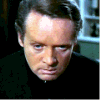Morality in post-war Japan figure largely in Ozu's films, and by 1961 conventions had changed remarkably from when Ozu started his career in the 20's. However, in The End of Summer, it's the patriarch of the family who brings shame to his children. The widower Manbei, played by Ganjirō Nakamura, keeps running off to visit his old mistress, with whom he may or may not have had an illegitimate daughter. He isn't very good at hiding his excursions either, and when he's confronted about them he brushes it off very unconvincingly. Meanwhile, the family business is on the verge of collapse, and two older daughters, one played by the Ozu favorite Setsuko Hara, wonder if they should marry men they don't love to help save it. There aren't many bright spots in this movie.
And yet, there's much to be grateful for - this is Ozu, after all. Manbei seems to care deeply about both his potential daughter and his other children and grandchildren. More importantly, he seems happy at the end of his life, and even a heart attack doesn't stop him for long. For all the pain he causes his children (and his wife, when she was alive), it's hard to deny him that. I do wish that the other storylines were more fleshed out - it seems like Hara doesn't have much to do in this one.
But one of the most fun things about this movie is that it's my first Ozu film in color - the beautifully maintained Japanese homes really come to life in unexpected ways. I'm particularly struck by all of the dark wood, which I didn't expect. Even Hara's face in color is a minor revelation. Of course I wish that Ozu had more time to utilize it - this would be his second-to-last movie.
Tuesday, July 1, 2014
Subscribe to:
Post Comments (Atom)

No comments:
Post a Comment